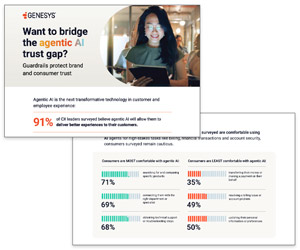Our panel of experts make their predictions of how the make-up of the contact centre will change and develop in 2020.
1. Mobile Customer Service Will Continue to Grow
When you look at the advent and roll-out of 5G and couple it with the ongoing evolution of smartphones, the power in every consumer’s pocket is ramping up all the time.
Customers are increasingly using mobile as a primary channel for interacting with organizations, even if companies themselves are not always on top of this.
Customers are increasingly using mobile as a primary channel for interacting with organizations, even if companies themselves are not always on top of this.
Recent Salesforce research indicated that 51% of customer service teams use mobile apps, compared to 82% of customers who use mobile apps for communicating with a company.
We expect to see businesses look to get further up to speed in 2020 by making investments either in a new app or in functionality within an existing one.
An example of this might be a bank that already has its own mobile app but adds call-back functionality into its live chat capability to improve the service customers receive over their mobile phones.
2. Homeworking Is Set to Be Embraced by the Wider Contact Centre Community
With an increasing number of contact centres using unified communications and collaboration environments, advisors will no longer be tied to desks, meaning they can work from other locations – including their very own homes.
We expect to see a big increase in this kind of working during 2020, to widen the demographic pool of potential advisors to recruit from and for business continuity purposes.

We expect to see a big increase homeworking… to increase the demographic pool of potential advisors to recruit from and for business continuity purposes.
In addition, organizations will be able to bring more people from different demographics into the conversation, but also to have that conversation anywhere at any time.
As contact centres look for new ways to engage their teams and look to overcome continued difficulties in hiring the right people, the growth of homeworking is set to soar.
3. The Thinking Behind Customer Journeys Will Improve
Over the course of 2020 we are likely to see more smart organizations mapping customer journeys and layering in automation, proactivity and AI in appropriate places, but also bringing in specialist skills to support these journey as and when needed.
The idea behind the connected enterprise is to bring in people with specialist skills as needed, whether in technology, problem solving, negotiation or in some specialist content area.

Jeremy Payne
This is effectively an evolution of the ‘super-advisor’ concept which was a popular topic of conversation a few years ago.
Today, instead of individual advisors being trained up to deliver all of these roles in one, the thinking is instead to bring in people across the wider business and ecosystem with specialist capabilities who can help where needed. More examples of this will likely be put into practice over the coming year
Thanks to Jeremy Payne at Enghouse Interactive
4. The Contact Centre Advisor Role Will Become More Complex
Increasing product complexity, product proliferation and the speed of innovation will make the job of a contact centre advisor even more challenging.
If your contact centre is finding that handling times are increasing and your knowledge base is being utilized more and more, this is likely the reason why.

Anand Subramaniam
So, what can you do to increase advisor knowledge? Increasing coaching and specializing advisors in one area while improving call routing are both good options. But there are cost and employee engagement concerns that we must acknowledge.
One other solution is to use AI technologies to provide conversational guidance to advisors for resolving complex problems, giving detailed advice or selling something. Solutions like this are something that many contact centres will likely look towards in 2020.
Thanks to Anand Subramaniam at eGain
5. The Command and Control Leadership Style Will Fall by the Wayside
Research from The Institute of Customer Service reveals that only 25% of UK employees feel actively engaged in their job, and the contact centre industry will have to react quickly to worrying findings like this.
We should consider how advisors welcome and appreciate the opportunity to be coached and developed, not just assessed.
But where will they address this issue? It needs to come from leadership, as we should consider how advisors welcome and appreciate the opportunity to be coached and developed, not just assessed.
So I believe that contact centres in 2020 will do more to ensure close ties between team leaders and advisors. This will include simple things such as shift planning to ensure leaders work at the same times as their team, all the way to a complete restructuring of the contact centre.
Which? have already restructured their contact centre and, in the process, have renamed their leaders “team coaches”, as we found out during a site visit.
To do this, Which? created a new position, where the new member of the team handled some of the tasks that took leaders away from their teams, so that they could spend more time with the advisors.
For more on better coaching leadership in the contact centre: Train Team Leaders Well
6. Customer Journey Maps Will Start to Be Made Operationally Useful
While most organizations have mapped their customer journeys, many are still created by external agencies, and that mindset too often carries through to the rest of the organization.
What I mean by this is that these maps aren’t yet being incorporated into the organizational strategy so that they are operationally useful to each department of the company, including the contact centre.

Charlie Mitchell
For example, the journey maps are not yet used by many for setting common goals and metrics, let alone for greater collaboration opportunities like tracking improvement priorities across the business.
So, I believe that organizations will soon put more effort into using customer journey maps as business tools and as a way of improving collaboration across the business.
Thanks to Charlie Mitchell at Call Centre Helper
For more insight into better utilizing customer journey maps across the organization, listen to the following episode of The Contact Centre Podcast, with industry expert Martin Hill-Wilson.
The Contact Centre Podcast – Episode 5:
How Can We Improve Customer Journeys To Create Happy Customers?
For more information on this podcast visit Podcast: How can we improve customer journeys to create happy customers?
7. Self-Scheduling Will Become More Widely Used
The self-scheduling capability will become more readily available with WFM systems, and for those who already have elements of this, I fully expect them to evolve it!
Employees being able to state where they work, when they work and what they work on is a concept that might scare some, but it is a concept that more people will become accustomed to.

Scott Budding
Why? As the Gen-Z (born after 1995) percentage increases, the importance of having technology (and processes) in place to support individuals determined to have flexible employment will increase with it.
Also, it will eventually reach a point where if no flexibility is offered then organizations will simply lose well-trained, highly skilled employees to those that do.
Thanks to Scott Budding at Business Systems
8. The Focus on Integrating Technologies Will Remain Strong
While the past few years have been characterized by businesses being bombarded by buzzwords and calls to act, many contact centres have been researching.
In 2020, we’ll see more of them ready to move forward with quality innovations that add value and reap real results for both them and their customers – not just short-term kudos.
Live chat technology will be particularly in demand and customers will expect to be able to move easily between bots and human interactions, without delay.
9. Voice Assistants Will Gain Ground in the Contact Centre
With more people using voice search, Web RTC (Real-Time Communication) via virtual assistants – like Siri and Alexa – will be popular.
WebRTC allows contact centres to stream conversations in real time through a web browser. It’s already used for video meetings, where you just click to join.

Ken Reid
Also, you don’t need any additional software or plugins, so it’s being used more widely by customer services for tasks like real-time messaging and screen sharing.
When 5G technology becomes widely available, WebRTC can be connected to provide mobile HD video conferencing for both companies and their customers.
Thanks to Ken Reid at Rostrvm Solutions
10. Flexible Working Will Become a Priority
Flexible working is much more than the defined “Flexible Working” policy of your business. Providing choice, certainty and control is crucial for your colleagues and for your business.
Aligned to your strategy, workforce optimization (WFO) can provide everyone with individually tailored flexibility which suits their needs.

Phil Anderson
This idea brings us to the importance of strategy and workforce alignment. The technology exists to support this process, and the knowledge and experience is known.
2020 will be the year when a single-source data hub will be used by finance, marketing, HR and planning to design the right workforce strategy.
Thanks to Phil Anderson at The Forum
11. Advisor Well-Being Will Take Centre Stage
When Puzzel conducted its recent survey of 100 contact centre professionals, an overriding sentiment was that advisors are key to delivering a high standard of customer experience.
Happy staff who feel valued and are listened to are more productive and better performers, and as contact centres begin to recognize this, they will take more proactive steps to improve well-being.
This will likely start with proper communication of expectations, goals and vision, coupled with a concerted effort to involve advisors in departmental decision-making and to create tangible opportunities for self-development.
Start with proper communication of expectations, goals and vision, coupled with a concerted effort to involve advisors in departmental decision-making.
Managers will have an even more significant role to play. They need to be approachable but to lead by example, encouraging collaborative knowledge sharing while making the time to understand and even muck in with the everyday challenges that advisors face.
While it’s not new, contact centres will realize the benefits of flexible working and introduce on-site facilities such as Amazon lockers or visiting medical staff for flu jabs. Both will support the all-important work–life balance that is critical to advisor well-being.
12. More Contact Centres Will Work Towards a Hybrid Workforce
As the trend of combining advisor intelligence with automation continues, the focus will be on utilizing AI to maximize the full potential of today’s hybrid workforce, so that they can efficiently increase productivity and enhance customer experience.
For example, the latest application of chatbots maximizes AI learning from the contact centre and other parts of the business to provide advisors with the real-time knowledge they need, along with suggested solutions, to solve customer problems.

Thomas Rødseth
This new technology of virtual personal assistants or “bot buddies” gives employees an opportunity to boost their performance at work and to grow their careers.
Advisors can engage with them through speech or text communication while the virtual technology works hard behind the scenes – helping to make their ever more difficult role less challenging.
Thanks to Thomas Rødseth at Puzzel
13. Advisor Soft Skills Will Become an Even Greater Focus as Customers Get Angrier
The frustration and anger with current politics, especially in the UK and US, will provide real challenges for call centre advisors.
In fact, CallMiner analysis of over 82 million calls to contact centres indicates that this anger is already spilling over into the way we communicate with each other.
The data shows that callers are increasingly using offensive language to verbalize their anger and frustration. This is only likely to get worse in 2020 if call centres aren’t prepared to handle customer interactions correctly.
Smart contact centres will recognize that angry and offensive calls last longer, negatively impacting advisor well-being, performance and loyalty…
Smart contact centres will recognize that angry and offensive calls last longer, negatively impacting advisor well-being, performance and loyalty, leaving the customer to question their relationship with the organization concerned.
So, I predict that the brands who deliver a better response to the swearing problem by devising strategies to react to offensive language will gain a competitive advantage in 2020.
14. Organizations Will Look to Improve the Way They Manage Data
There are lots of great new customer service strategies – including personalization, proactivity and chatbots – but they each require a large amount of good-quality data. So, better managing this data will become a priority for many.
Advanced contact centres will activate the oceans of unstructured data they collect, and one way to do this is through AI-fuelled analytics.
This is great for helping to enact each of the new customer service strategies above. Let’s use proactive customer service as an example here.

Frank Sherlock
With analytics, brands can better anticipate customer needs, as by analysing historical interactions it will be possible to identify how customers respond to different situations.
As a result, brands will be able to create a proactive plan, as more and more companies are doing, while also realizing other benefits, such as predicting customer reactions to marketing campaigns.
Thanks to Frank Sherlock at CallMiner
15. Organizations Will Re-appreciate the Value of Voice
The phone plays a vital role in improving customer service by allowing businesses to personalize communications to the individual.
Despite this, while the digital world is witnessing a whole host of exciting innovations, many businesses’ telephony systems remain in the dark ages, delivering slow, frustrating and un-personalized experiences.

Ian Moyse
This will change in 2020, and I expect that we will see increased adoption of emerging technologies in the contact centre.
These technologies may include AI for real-time voice translation and IVR personalization, which will disrupt the market and help brands who are looking to place the customer experience at the heart of their strategy.
Thanks to Ian Moyse at Natterbox
16. Some Brands Will Try to Get More Personal With Customers
Customers want access to brands, but they also want that access to feel personal to them, rather than copy and pasted responses – particularly if that customer is in a highly emotional state.
If the interaction feels robotic and irrelevant to the user, then it is likely to result in a negative customer experience.
Over the next year, brands may begin to ‘get personal’ by trying to incorporate different elements when bringing in self-service and automation.
One method would be to route customers making a repeat query to the same advisor they dealt with previously, so they don’t have to repeat themselves.

Sunny Dhami
Another might be giving certain advisors responsibility over particular types of queries. For example, a dedicated team who handle technical complaints and are equipped to best advise this type of customer.
With this combined strategy of technology and personalization, contact centres can help meet customer demands in the coming year.
Thanks to Sunny Dhami at RingCentral
17. More Contact Centres Will Move to the Cloud
To unify communications, the number of contact centres moving to the cloud will gather momentum in 2020 as companies look to reduce costs, break down internal data silos and focus on delivering outstanding customer experiences.
Being in the cloud, front-office and back-office departments will be able to interact seamlessly to meet customers’ needs.
Advisors will also be able to identify and start a chat with internal experts who can provide instant answers to customer queries, and if needs be, route the customer’s call directly to the expert.
Front-line customer service advisors will also be able to identify and start a chat with internal experts who can provide instant answers to customer queries, and if needs be, route the customer’s call directly to the expert.
Clunky transfer processes for the customer will be removed as authentication only needs to be performed once and the integrated communications data will afford exciting possibilities when it comes to introducing AI innovations.
18. AI Experimentation Will Start to Provide Improved Results
In 2020 early adopters of AI will likely learn from their early experimentation and develop valuable use cases for AI.
There will be a growing realization that just investing in AI technology will not guarantee success; companies need to identify where AI can improve internal processes, reduce cost to serve and enhance the experience for the customer.

Sadam Iqbal
AI will increasingly be adopted to create self-service applications that respond to customer needs in a more naturalistic and seamless way.
There will also be a renewed focus on developing the linguistics around AI and training machines to support customers in new ways.
Thanks to Sadam Iqbal at Intrado
19. Advisors’ Roles Will Change to Problem Solvers
With more of the menial tasks managed by technology, the advisor role will change, in order to manage the more complex issues that emerge.
So, you must ensure that your employees have the skills to handle these types of calls efficiently.
Solving these queries effectively and confidently will mean training staff and ensuring that they have the right tools.
Solving these queries effectively and confidently will mean training staff and ensuring that they have the right tools in place to handle challenging calls.
Upskilling employees also has the hidden benefit of reducing churn, as advisors feel more confident and able in their roles.
20. Contact Centres Will Look to Automation to Increase Productivity
The integration of AI in contact centres is set to be great at effectively managing low-level queries, ensuring that customers have a low-effort experience in resolving their issues. This can enhance customers’ interactions with companies while also increasing productivity within the business.

Tim Kimber
For many, 2020 will be the time to look at what AI can offer their contact centre and whether their company can move towards advanced solutions.
If you are part of one such company, first establish what is needed to help customers with their queries and then you can create the best solutions for them.
Thanks to Tim Kimber at NewVoiceMedia
BONUS TIP – Data Security and Privacy Will Become a Primary Focus
As contact centres continue to implement AI for automation and self-service, the priorities of both the enterprise and its customer service representatives will continue to evolve. 2020 lends itself to a focus on security and privacy of data.

Priyanka Tiwari
With large global data breaches becoming a more common occurrence, enterprises have an increased responsibility to protect more than their own data integrity. They have an obligation to secure the sensitive and personal data of their customers as well.
Given this, there will be a large focus on programs and technology that protect customers’ data and privacy from being compromised.
Thanks to Priyanka Tiwari at Interactions
To find out more up-to-date predictions, read our article: 30 Contact Centre Predictions for 2021
For more from our panel of experts, read our articles:
- 22 Contact Centre Cost Saving Ideas
- 23 Considerations to Make Before Implementing a New Digital Channel
- 20 Contact Centre Objectives
Author: Jonty Pearce
Published On: 20th Nov 2019 - Last modified: 14th Aug 2025
Read more about - Customer Service Strategy, Anand Subramaniam, Artificial Intelligence (AI), CallMiner, Charlie Mitchell, Customer Journey, eGain, Enghouse Interactive, Frank Sherlock, Ian Moyse, Interactions, Intrado, Jeremy Payne, Ken Reid, Martin Hill-Wilson, Natterbox, Phil Anderson, Puzzel, Remote Working (Homeworking), RingCentral, Rostrvm, Sadam Iqbal, Scott Budding, Service Strategy, Sunny Dhami, The Forum, Thomas Rødseth, Tim Kimber, Trends, Vonage









































